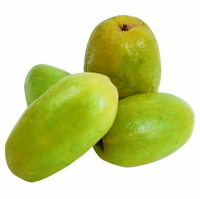Origin Of Passion Fruit - Passion fruit plants belonging to the genus Passiflora. botanists noted that there are more than 400 species of passion fruit that grows in the world and 40 species of which are from South America, 40 species are from Asia, Australia, and 11 species are from Madagascar. There are currently 20 species that can be consumed. There are 5 (five) types of passion fruit that are cultivated, including the following:
| No | Passion Fruit Types | Latin Names | |
|---|---|---|---|
| 1. |
Purple Passion
|
Passiflora edulis
var. Edulis
|
|
| 2. |
Sweet Passion /
Sweet granadilla
|
Passiflora lingularis
|
|
| 3. |
Yellow
|
Passiflora edulis
var. Flavicarpa
|
|
| 4. |
Giant Passion /
Granilla
|
Passiflora
quadrangularis
|
|
| 5. |
Banana Passion
|
Passiflora
mollissima
|
|
Origin Of Passion Fruit | Benefits for health - Inside the passion fruit there is also an abundant content, which includes energy, protein, carbohydrates, calcium, phosphorus, iron, vitamin A, vitamin C and many more ingredients in passion fruit. Besides that passion fruit is also good for us to consume directly or it can also be used as juice.
+ Passion fruit tree
Passion fruit trees are scientifically called Passiflora guadrangularis. As a member of the Passiflora family, passion fruit is still a family with passion fruit. Passion fruit trees include shrubs. His life propagates. Therefore this plant has a stem that is small, long, and not rigid. Different from the shape of the plant stem in general, the quadrilateral passion fruit tree. In this stem, besides having leaves and flowers, also grow spiral-shaped tendrils.
+ Passion fruit
Passion fruit with oval shape about 20cm long. The diameter is about 15 cm, while the weight is 3-5 kg. About the size of the papaya fruit in Bangkok. Hmm ... No wonder that passion fruit is called giant passion fruit. Hollow passion fruit. Inside the cavity there are many seeds, just like passion fruit in general. Passion fruit that is ripe, smells good and tastes good. Passion fruit is rarely eaten directly. Usually passion fruit that has been cut into pieces is mixed with syrup and ice, into fruit ice.
+ Passion fruit flowers
Passion flower is a single flower. That is, in one stalk there is only one flower. The flowers are big purple. Consists of many strands that form a bowl. Passion flower is a two-flowered flower (Hermaphrodite). In the "bowl" there is a pistil and stamens.
Origin Of Passion Fruit | Benefits for health - Pollination can occur by itself, it can also be with the help of insects. However, usually passion fruit trees planted at home, pollination is assisted by human hands. Usually with the help of sticks or other objects, humans touch the pistil to the stamens.
+ Passion fruit types are rare
In the past, about 30-40 years ago, many people planted passion fruit. Besides being delicious to eat, passion fruit trees can be used for shade and home decoration. People usually make pergolas on the terrace, where passion fruit stems creep. The house terrace is covered with green passion fruit leaves with purple passion fruit flowers. While passion fruit dangles. It really makes a house beautiful. But that first. Now passion fruit trees are becoming scarce, because rarely do people grow passion fruit trees anymore. This plant can grow at an altitude of 800-1500 m above sea level, the way it develops is generally propagated by cutting and connecting techniques.
= Nutrition Content Passion fruit
Passion fruit or in Latin, Passiflora quadrangularis, is often known as Passion Fruit or large passion fruit. passion fruit itself comes from tropical regions in South America, namely Brazil, then Venezuela, Colombia and Peru. Then Passion Fruit spread from South America to various countries through the Spanish. In Europe itself Passion Fruit was known in the 17th century, then the 19th century began to be known and planted in South Africa, Hawaii and New Zealand. Here are some properties of passion fruit for health:
- 1. As a nerve sedative
Passion fruit itself is very efficacious to calm the nerves. This fruit is also a source of several vitamins, especially vitamin C and vitamin A and antioxidants. In an invitro study conducted at the University of Florida also found that fruit extracts contain phytochemicals that can kill cancer cells. South Americans use this fruit traditionally by eating this fruit it can help make it easier to sleep. Even according to them, eating passion fruit before going to bed can make a beautiful dream. Drinking a glass of cold passion fruit juice can help the nerves relax and feel more calm.
- 2. As AN anti-seizure
This fruit is extremely abundant useful to health like organic process content, efficacious as a pain reliever, anti-seizure, colitis, sedative, and anti inflammatory. Disorders like constipation, diarrhea, insomnia, expelling disorders, cough, hoarseness, dry throat may be driven away by this fruit. passion fruit pulp may be wont to soothe the nerves of headaches, relieve diarrhea and neurastenia ( weakness, insomnia, chronic fatigue, inability to concentrate, and , lack of appetite).
- 3. As an anti-cancer
In vitro studies at the University of Florida also found that extracts of berries contain many phytochemicals that can kill cancer cells. Phytochemicals include polyphenols and carotenoids. Other phytochemical content in passion fruit is harmol, harman, harmony, passaflorine, harmine, chrysin, carotenoid, vitexin, and isovitexin. While content such as energy, protein, fiber, minerals, calcium, phosphorus, niacin, iron, fat, carotene, thiamine, ascorbic acid, riboflavin, and citric acid.
- 4. Good for digestion
Passion fruit has a high fiber content. This is very beneficial for digestive, digestive and intestinal tract health to be clean. Seeds from this fruit can be eaten because they contain fiber. Passion fruit can also be used as a mild laxative. Food fiber in passion fruit can improve digestive ability through improving the quality of defecation, is also able to control hemorrhoids, eliminate toxins from the intestine, reduce the risk of colon cancer and improve the overall function of the digestive system.
- 5. Rich in vitamin C and antioxidants
Antioxidants are found in foods that contain vitamin C, which is responsible for inhibiting the growth of cancer cells in the body. Passion fruit has water and fat-soluble antioxidants. One of the main antioxidants found in this fruit is beta-carotene. Passion fruit is a good source of vitamin C, one serving of 100 g (3.5 ounces) contains 30 mg of vitamin C. This vitamin C can also boost immunity and is an antioxidant. Fruits also contain calcium, flavonoids and other nutrients that fight cancer and other diseases, also improve overall health.
- 6. As a medicine for asthma sufferers
Passion fruit is very good for people with asthma because the fruit is very nutritious and healthy which can calm asthma attacks. In addition to containing vitamin C, passion fruit has a histamine blocking effect that causes asthma symptoms. Eris fruit has a relaxation effect.
- 7. To deal with chronic cough
Passion fruit extract is known to be beneficial for asthma, it also can overcome chronic cough. This is because this fruit contains antioxidants which are believed to have the ability to block histamine, reduce inflammation and relieve other symptoms of allergic reactions.
- 8. Contains vitamin A
- 9. Healthy heart
Passion fruit is also a food source that contains potassium (containing 348 mg in every 100 grams). This mineral has a healthy effect on the human heart and helps the function of the heart, blood flow and pressure in the body. The level of potassium they contain is very good so it can regulate contractions in muscle blood pressure in the heart. It is also a potassium counter depleting effect on certain drugs and diuretics.
- 10. Good fruit for diet
Besides potassium, passion fruit also contains iron, magnesium and calcium. This fruit is recommended for diet for people who are on a diet. This is because passion fruit has low calories, only 97 calories per 100 grams. Passion fruit is also low in sodium and fat.
- 11. Can lower cholesterol
Passion fruits are also foods that contain carbohydrates and natural sugars in good quantities. Nutrition in this fruit works to reduce cholesterol levels in the body. The high fiber content in this fruit makes those who eat it become full, so they don't want to eat other foods. Blood cholesterol can be reduced through the amount of dietary fiber contained in passion fruit. Studies in healthy mice showed that passion fruit extract can decrease LDL and HDL cholesterol.
- 12. Can regulate blood sugar
Alkaloids in passion fruit alone have shown benefits in type 2 diabetes by reducing insulin resistance. This causes passion fruit to help regulate blood sugar levels better. In addition to reducing total cholesterol before also simultaneously reducing triglycerides and maintaining blood glucose and maintaining body weight.
- 13. Reduce the risk of heart disease in people with blood sugar
Passion fruit extract can help reduce the risk of cardiovascular disease in those with type 2 diabetes. It also reduces systolic blood pressure and glucose levels in people with high blood sugar.
- 14. As an alternative food
Passion fruit contains the highest concentration of total sterols found compared to other fruits. Passion fruit has the second highest sterol content among all fruits and vegetables. Passion fruit is an excellent alternative.
- 15. As an anti-inflammatory
Passion fruit can increase the level of immunity because the content of vitamin C is rich in antioxidants, thus protecting the body against various infections and diseases. Passion fruit contains around 13 carotenoids in sufficient quantities to make a positive health impact. These carotenoids act either as vitamin A precursors or provide antioxidant activity.
- 16. Reducing the pain of patients with knee osteoarthritis
Passion fruit extract also reduces pain and stiffness in those with knee osteoarthritis. This is because passion fruit has anti-inflammatory and antioxidant activity.
There has been considerable discussion about the Origin Of Passion Fruit | Benefits for health. I apologize, if there is an error from this article. Finally, please leave your comments below as support and participation !!!




















Shooting Casino: Play Craps, Blackjack, Roulette & More
ReplyDeleteShooting Casino has been around since 2006. This is the hottest online casino! You have access to hundreds of games, most popular and the 제왕 카지노 보증 most rewarding